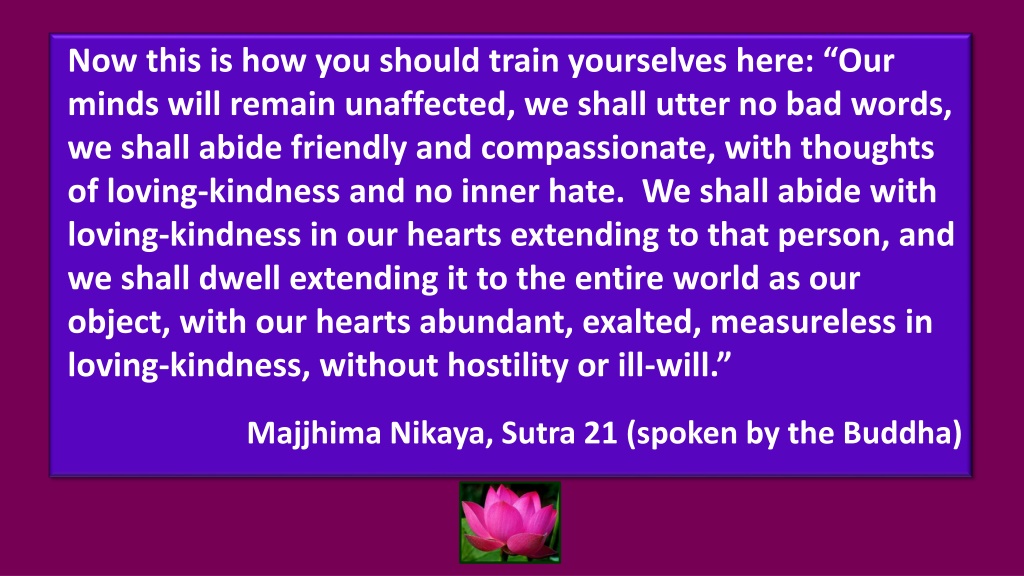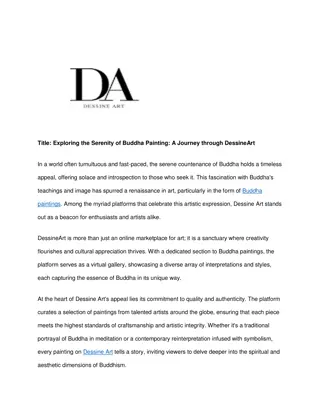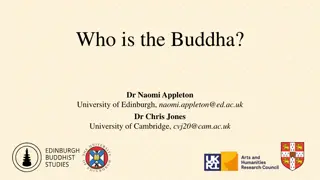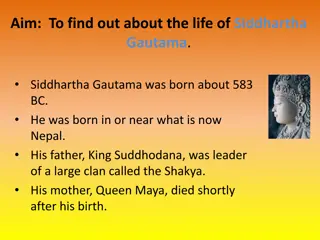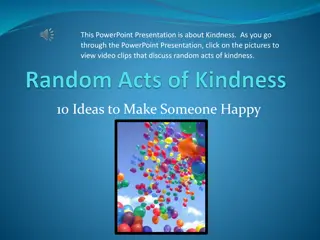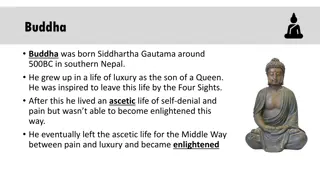Embracing Loving-Kindness: Wisdom from the Buddha
Explore the timeless teachings of the Buddha on cultivating loving-kindness, compassion, and equanimity in our hearts. Discover the transformative power of Mettā, Karuṇā, Muditā, and Upekkhā as pathways to inner peace and universal love, as shared in the Majjhima Nikaya. Dive into the essence of Brahmavihāras and their significance in daily life.
Download Presentation

Please find below an Image/Link to download the presentation.
The content on the website is provided AS IS for your information and personal use only. It may not be sold, licensed, or shared on other websites without obtaining consent from the author.If you encounter any issues during the download, it is possible that the publisher has removed the file from their server.
You are allowed to download the files provided on this website for personal or commercial use, subject to the condition that they are used lawfully. All files are the property of their respective owners.
The content on the website is provided AS IS for your information and personal use only. It may not be sold, licensed, or shared on other websites without obtaining consent from the author.
E N D
Presentation Transcript
Now this is how you should train yourselves here: Our minds will remain unaffected, we shall utter no bad words, we shall abide friendly and compassionate, with thoughts of loving-kindness and no inner hate. We shall abide with loving-kindness in our hearts extending to that person, and we shall dwell extending it to the entire world as our object, with our hearts abundant, exalted, measureless in loving-kindness, without hostility or ill-will. Majjhima Nikaya, Sutra 21 (spoken by the Buddha)
A Few Basics of Buddhism New Four-Part Session Structure Chanting & Meditation with Ven. Yi-Hung Shifu Exploring the teachings of kyamuni Buddha Break Introduction to Gong an (Japanese: K an) meditation practice Discussion of article on applying Buddhism in one s daily life
A Few Basics of Buddhism and How to Integrate Them into Our Daily Lives Session 8
A Few Basics of Buddhism Four Brahmavih ra (Four Divine Abidings, Immeasurable Minds; Chinese: ) Mett Loving Kindness ( ) Mudit Empathetic Joy ( ) Karu Compassion ( ) Upek Equanimity ( )
Brahmavihra (C. ) What s in a name?
Brahmavihra (C. ) Brahm Vih ra
Brahmavihra (C. ) Brahm The name of a god the Buddhist myth of the god Brahma, who had four faces, one for each of the four kinds of unselfish love championed in Buddhism metta, karuna, mudita, and upekkha. Gil Fronsdal
Brahmavihra (C. ) Brahm The name of a god Brahmin: It would be good if the Reverend Gotama were to teach us the way to union with Brahm , may the Reverend Gotama help the people of Brahm . Buddha: with his heart filled with loving-kindness, he dwells suffusing one quarter, the second, the third, the fourth. Then with his heart filled with compassion, with sympathetic joy, with equanimity he dwells suffusing one quarter Tevijja Sutta: The Threefold Knowledge The Way to Brahm (Digha Nikaya 13)
Brahmavihra (C. ) Brahm Divinities (Sanskrit: Deva; Chinese: ) The name of a god Demigods (S: Asura; C: ) Highest gods (the Brahma Deva) Humans One who assiduously develops these four sublime states [Brahmavih ra], by conduct and meditation, is said to become an equal of Brahma (brahma-samo). If they become the dominant influence in his mind, he will be reborn in congenial worlds, the realms of Brahma. Therefore, these states of mind are called God-like, Brahma-like. Animals Ghosts Hell denizens Nyanaponika Thera
Brahmavihra (C. ) Brahm The name of a god Highest gods (the Brahma Deva) Divine
Brahmavihra (C. ) Brahm Vih ra
Brahmavihra (C. ) Vih ra Monastery, abiding/abode [The Brahmavih ra] are called abodes (vihara) because they should become the mind s constant dwelling-places where we feel at home ; they should not remain merely places of rare and short visits soon forgotten. Nyanaponika Thera
Brahmavihra (C. ) Appamma (Sanskrit: Apram a) Boundless states, limitless qualities Chinese: (S w li ng x n)
Brahmavihra (C. ) Mett Loving Kindness ( ) Friendly person Mean person Feel friendly toward her, wish her to be happy? Feel friendly toward him, wish him to be happy?
Brahmavihra (C. Karu Compassion ( ) ) Homeless person who damaged park to power t.v. Feel compassion toward him/her? Sick child Feel compassion toward her?
Brahmavihra (C. Mudit Empathetic Joy ( ) ) Topper, the Biggest Braggart in the workplace If Topper gets a raise and you don t, do you Feel joy for him? Baby first experiencing bubbles Feel the joy?
Brahmavihra (C. ) Appama a Boundless states Without limits, nondiscriminatory Chinese: (s w li ng x n)
Brahmavihra (C. (Kara ya) Mett Sutta: Good Will (Sutta Nipata 1.8) ) Happy, at rest, may all beings be happy at heart. Whatever beings there may be, weak or strong, without exception, long, large, middling, short, subtle, blatant, seen & unseen, near & far, born & seeking birth: May all beings be happy at heart.
Brahmavihra (C. ) Mett Loving Kindness ( ) Just as I wish to be happy and free from suffering, so may that being, may all beings be happy and free from suffering. Comes from the Pali word mitra, which means friend. The Sanskrit word mitraalso refers to the sun the warmth and radiance of metta flows in the heart of all living beings. Bhante Gunaratana. Mindfulness in plain English, p. 175
Brahmavihra (C. ) Mett Loving Kindness ( ) Mett is an antidote for ill-will From a Buddhist psychological perspective, ill will is rooted in fear the fear of loss, the fear of harm. Feldman, Christina. 2017. Boundless heart: the Buddha s path of kindness, compassion, joy, and equanimity, p. 14
Brahmavihra (C. Mett Loving Kindness ( ) ) Ill-will Fear of Harm Judgment, blame, harshness, rejection, condemnation, and suspicion leave a powerful imprint on our hearts and minds. We are prone to obsess about those we fear and dislike. We begin to abide in aversion. Feldman, Christina. 2017. Boundless heart: the Buddha s path of kindness, compassion, joy, and equanimity, p. 13, 18
Brahmavihra (C. Mett Loving Kindness ( ) ) Ill-will Negative Effects of Our Ill-Will toward Others Inner pain when we judge, condemn, or are harsh to another in defense Sickens us and leaves powerful footprint on the world Sets in motion downward spirals of depression and debilitating anxiety Isolation, mistrust, defensiveness toward others as well as self-loathing Feldman, Christina. 2017. Boundless heart: the Buddha s path of kindness, compassion, joy, and equanimity.
Brahmavihra (C. Mett Loving Kindness ( ) ) Making Better Choices In every moment there is a choice about where we make our home Abide in the world of fear and aversion? Abide in the world of kindness, mindfulness, and befriending? Feldman, Christina. 2017. Boundless heart: the Buddha s path of kindness, compassion, joy, and equanimity.
Meditation on Mett from the Visuddhimagga* Start with oneself May I be happy and free of suffering. Just as I want to be happy and dread pain, as I want to live and not to die, so do other beings, too. A teacher or preceptor, a benefactor May ____________ be happy and free of suffering. A dearly beloved friend A neutral person A hostile (difficult) person *Visuddhimagga (English: The Path of Purity; Chinese: )
Above All-pervasive loving kindness West East Below
Brahmavihra (C. ) Karu Compassion ( ) May you find healing. May you be free from sorrow. May you find peace. It is compassion that removes the heavy bar, opens the door to freedom, makes the narrow heart as wide as the world. Compassion reconciles us to our own destiny by showing us the life of others, often much harder than ours. Nyanaponika Thera
Brahmavihra (C. Karu Compassion ( ) ) Two parts Empathy we care enough not to turn our gaze away from the suffering of others Impulse to help alleviate that suffering
Brahmavihra (C. ) Mudit Empathetic Joy ( ) I take joy in your good fortune. May your happiness continue. Your life will gain in joy by sharing the happiness of others as if it were yours. It is in your power to increase such experience of sympathetic joy, by producing happiness in others, by bringing them joy and solace one possessed of joy finds that serene calmness leading to a contemplative state of mind. Nyanaponika Thera
Brahmavihra (C. ) Uppekkha, Upek Equanimity ( ) May I embrace change with stillness and calm. May I deeply accept this moment as it is. May my home be a home of balance and spaciousness. Equanimity is a perfect, unshakable balance of mind, rooted in insight. the kind of equanimity required has to be based on vigilant presence of mind, not on indifferent dullness. Nyanaponika Thera
Brahmavihra (C. Uppekkha, Upek Equanimity ( ) ) Two insights needed for equanimity Karma the various experiences we undergo result from our actions in thought, word, and deed performed in this life and in previous lives. Knowing this we can: Take refuge from our fear by concentrating on confidence in good deeds in the past. Summon the courage to perform more good deeds right now, despite the discouraging hardships of our present life Nyanaponika Thera
Brahmavihra (C. Uppekkha, Upek Equanimity ( ) ) Two insights needed for equanimity No-Self in the ultimate sense deeds are not performed by any self, nor do their results affect any self. It is the delusion of a self that creates suffering and hinders or disturbs equanimity. If this or that quality of ours is blamed, one thinks: "I am blamed" and equanimity is shaken. If this or that work does not succeed, one thinks: "My work has failed and equanimity is shaken. If wealth or loved ones are lost, one thinks: "What is mine has gone" and equanimity is shaken. To the degree we forsake thoughts of "mine" or "self"' equanimity will enter our hearts. Nyanaponika Thera
May all beings be happy and free of suffering. May they achieve enlightenment in this lifetime.
